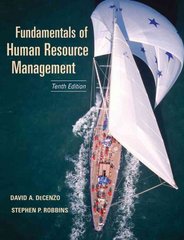Ann Fudge has built her career by breaking through the barriers that have frustrated women and minorities
Question:
Ann Fudge has built her career by breaking through the barriers that have frustrated women and minorities in gaining access to the top levels of management. Not only did she break the “glass ceiling” to work her way to head of a division at Kraft Foods, but as a woman of color, has headed one of the nation’s largest advertising and communication companies. After graduating from Simmons College with a bachelor’s degree in management and earning an MBA from Harvard, Ann Fudge embarked on a career with General Foods (which later became part of Kraft Foods) as a marketing assistant. Her early career efforts were met with tremendous success. Her performance excelled, propelled by a knack for developing successful marketing campaigns. As a brand manager, she was credited with rekindling the excitement behind Kool-Aid, Log Cabin Syrup, and Stove Top Stuffing. She did this while controlling costs and increasing product quality. For her efforts, senior managers at Kraft rewarded her with a promotion to head of the Beverages, Desserts and Post division of the company. This division had annual revenues in excess of $5 billion and accounted for more than 15 percent of the entire company’s revenues.
After just a year into the job, Fudge stunned everyone. She announced that she was quitting. She was leaving her job—not to focus completely on raising her children or for a bigger challenge in another organization. Rather, she was quitting so she could spend time on herself. After more than twenty years of working incessantly and infrequently seeing her family, she had had enough. Fudge wanted to go cycling, enjoy her house, and sit on her front deck and read a book. She wanted to meditate, and to have a “normal” life of eating a home-cooked dinner with her husband. For two years she did just that. After her self-imposed sabbatical, she decided to return to the world of work. In late 2003, Fudge was lured back to corporate America with an opportunity to take the helm of the advertising and communication company Young and Rubicam. A company with revenues of about 40 percent of her previous job, she was taking over an organization that was having serious problems. The past several years, under its previous leadership, the company was neglected. Executive greed was rampant. But more important, the organization was losing customers—so many that it had lost nearly two-thirds of its revenues. Fudge said she was excited by the challenge of turning around Y&R. She wanted to make a difference and build a company that worked with independent businesses in an effort to identify problems and implement workable solutions. Fudge left Young and Rubicam in late 2006 to increase her commitment to community involvement and become more involved in the nonprofit sector. Her current involvement includes the board of the Rockefeller Foundation and the Council on Foreign Relations.
Questions:
1. Describe what has happened in this case to Ann Fudge in terms of career stages.
2. Do you believe that Fudge suffered a mid-life career crisis? Defend your position.
3. What can organizations do to prevent talent like Ann Fudge from leaving their organizations? Explain.
Step by Step Answer:

Fundamentals Of Human Resource Management
ISBN: 9780470169681
10th Edition
Authors: David DeCenzo, Stephen Robbins





